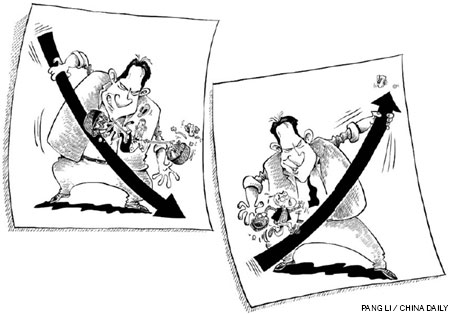Opinion
Debate: Farm product prices
(China Daily)
Updated: 2010-11-15 14:44
 |
Large Medium Small |
Agricultural products affect the livelihoods of many people. The government should keep speculators away from farm products to protect the interests of farmers and consumers both.
Li Changping
Farmers must have larger say in market
Prices of several non-staple farm products have increased drastically. It is important to find the reason for such a sharp increase to cope with the resultant problems.
I think the rapid rise in prices reflects the drawbacks in the distribution system and market mechanism. The sharp increase in the prices of some farm products does not necessarily mean that other farm products are being sold at reasonable prices. In fact, some are even undervalued.
To some extent, the rise in prices is an irreversible trend. The costs of production and labor have been increasing for years. Compared to that, the prices of farm products were low for a long time. Such situations harm farmers who put in their labor, money and time to produce them. That's why the government should establish a mechanism to ensure that farm product prices keep increasing, albeit in line with the movements in the market.
But such an arrangement will hurt low-income households. They are the most vulnerable group of society not only because of their low incomes, but also because of the lack of necessary social security. This problem can be solved if the government takes measures to reform the income distribution system and improve the social welfare system.
Speculation in farm products, which leads to price rises, is not as complicated as that in the real estate sector. The middlemen can easily drive up the prices of farm products because they play the key role in fixing prices. And they do so because rural producers' and urban consumers' cooperatives cannot play their true roles for lack of a proper mechanism. The result: Farmers get much less than they deserve and consumers pay much more than they should.
As is evident, the greatest beneficiaries of the current increase in prices of farm products have been the middlemen. They buy the products and hoard them to artificially raise their prices.
A sharp rise in the prices of farm products is generally followed by a fall. In such cases, it is again the producers that suffer the most, because the middlemen use the falling prices to pay them even less.
Given such a situation, it is imperative for the government to take measures to let real demand and supply determine the prices of farm products. The government should also build a sound distribution system for farm products and strengthen market supervision. These steps are necessary to prevent farmers and consumers from suffering at the hands of the middlemen.
Besides, it is important for the government to take two more measures. First, to prevent an artificial increase in the prices of farm products, it should improve the production of farm products instead of only combating speculators.
China has to achieve self-sufficiency in major farm products and grant farmers more powers to play a greater role in the market, especially in fixing prices. This will be possible only if the government sets up efficient producers' cooperatives and helps rural collective economic organizations build "food banks" and modern warehouses.
Moreover, the government has to establish a system that will make it possible for farmers to establish regional production associations to enjoy a greater say in the market.
To ensure that the distribution system functions properly, the government should help set up rural producers' and urban consumers' cooperatives and guide them to build a production and sales alliance, and improve the State purchase system.
Governments at all levels should control the key elements of agricultural products' logistics. The chance to purchase and store farm products should first be given rural producers' cooperative and key State enterprises, rather than private and foreign enterprises.
Second, to ensure fair competition in the farm sector and prioritize food security, the government should help private capital to "go global" and prevent it from engaging in speculation in the domestic market. As far as trade goes, the government has to pass a regulations to make it mandatory for foreign companies doing business in farm products to cooperate with producers' cooperative to ensure prices do not skyrocket without a valid reason.
The author is a professor at the Rural Development and Construction Research Center, Hebei University. The article was first published in Banyuetan magazine.
Zheng Fengtian
Blame it on speculators and hot money
Prices of several agricultural products have skyrocketed. The rise in prices, which began last year, has affected many people's livelihoods. There are several reasons for the drastic rise in prices of agricultural products, such as climate change, high inflation and the increasing cost of labor.
But there is no justified reason for the jump in the prices of non-staple farm products (from garlic, mung beans and ginger, to apples).
I think the sharp rise in prices of some non-staple farm products has been caused by the flow of hot money into the economy, which has increased speculation.
Speculators target non-staple farm products for four reasons. First, since non-staple farm products are grown on a small scale in the country, speculators can use a couple of billion yuan to hoard a large percentage of a certain product to influence the market and manipulate its price.
This process is rarely seen in major staple farm products, such as corn and soybean, which are grown in huge amounts, because speculators would have to invest hundreds of billions of yuan to hoard enough of the products to influence the market.

Second, the areas where non-staple agricultural products are grown are always concentrated in certain regions, which can be easily controlled by speculators for bulk buying.
Commercialized agriculture has been developing fast in China. The production pattern of "one village, one product" and "one town, one industry" has spread to many areas. The wholesale markets of some farm products are the farms where they are grown. For example, the major growing areas, wholesale markets and cold storage for garlic are in Shandong province.
Third, compared with perishable vegetables, some non-staple farm products such as apples can be stored for a long time in cold storage. This gives speculators the time to raise prices artificially.
Fourth, although the prices of some farm products have fluctuated widely in recent years, their prices are actually low, giving the market (and speculators) plenty of space to increase them. For example, the prices of garlic and mung beans in the domestic market were lower than in the international market last year. That gave speculators the chance to drive them up considerably in the domestic market.
More importantly, the government has no foolproof method to adjust and control the prices of non-staple farm products. Wild fluctuations in the prices of staples like rice, corn and wheat are not seen because the government has several macro-control measures to regulate them, one of which is public purchase.
Considering that the overall price of farm products is low, the government should allow their prices to rise to a reasonable extent. But there is a danger here. If the authorities let the prices of some speculator-controlled non-staple farm products rise sharply, it will have a reverse domino effect, leading to a sharp rise in the prices of many other farm products.
The national economy is facing severe inflationary pressure, and the proportion of farm products in the consumer price index is on the high side. If the government allows the prices of farm products to rise sharply, it will harm the overall economy. Since most farm products are essential goods, a rise in their prices can easily lead to an increase in the prices of other products. And the spiraling effect can lead to a sharp increase in inflation.
However, perhaps the worst part of a rise in prices of non-staple farm products is that farmers benefit little from it. Actually, the role of speculators can cause them great harm. Speculators usually make huge profits by hoarding and artificially raising prices.
Since rapidly rising or falling prices of farm agricultural products have a direct bearing on farmers' lives, the government should take measures to avoid volatile fluctuations. This is important especially to save small farmers from losing whatever little money they have.
Stabilizing the prices of farm products is very important for China and its people. Even non-staple farm products are important for people's livelihoods. Hence, the government should take steps to keep speculators away from farm products to protect the interests of farmers and consumers both.
The author is a professor at the Rural and Agricultural Development Institute of the Renmin University of China.



